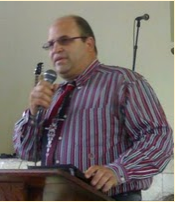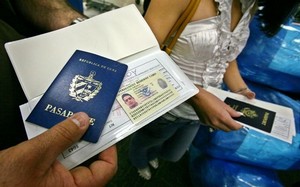
The polls don’t lie. All the surveys, in Cuba and among Cubans living in the U.S., indicate that the majority are in favor of family reunification and travel to the island.
The political posturing doesn’t matter. Delfin has lived in Jacksonville, Florida since 1996 and is far from appreciating the Castros’ government. In the U.S. he has always voted Republican.
Until the 2008 elections. He voted to punish John McCain due to the position of the George W. Bush administration the theme of travel to Cuba.
“I’m betting on serious and profound changes in the economy and politics of the Castro regime. I think a broad sector of Cuban-Americans want democracy in that country. If we had felt good in our own country, we never would have emigrated. Cuba hurts. It’s not working economically. But our relatives are in Cuba. No one in their right mind would stop sending dollars and medicines. The more we send the better,” Delfin says, on his third trip to Havana in the last year.
If you want to know how Cubans living in Florida think, go to Terminal 2 at Jose Marti airport. After being gone twelve years, Sandra has returned. On the way into the old town, she looks at the the ruins of many building with moist eyes.
When her rental car pulled up the tenement where she lived, she started to cry. “I was born here and became a professional. On the roof of the tenement I had my first romances. Things in Cuba are going badly. But the country is not something disposable. Here I have friends and family,” says Sandra, who after two weeks in the capital, isn’t used to eating so much pork and drinking beer.
When a relative or friend visits their native province, the parties and binges don’t stop. Between music and rum they talk about the past. Nostalgia is a thief that steals strength.
Oscar lives in New York and wants to see the hateful travel permit — the white card — disappear. Ninety percent of Cubans on both shores do not look kindly on the arbitrary policy of the Castro brothers, authorizing who can and cannot enter their country.
Cuba belongs to all Cubans. And they should not require permission to visit it. And even being able to return, permanently, if they wish. That a high percentage of Cuban-Americans do not like the Castro regime, doesn’t mean that they agree with the tightening of the embargo. Nor with the measures proposed by Congress members of Cuban origin to restrict travel to the island.
Ernesto, a down-on-his-luck guy from Santiago who lives in Hialeah, gets angry when the topic comes up. “The problem is a personal issue for some. A family issue. The Diaz-Balarts and the Castros are related. Fidel’s oldest son, Fidel Castro Diaz-Balart, is Lincoln and Mario’s cousin. And these politicians don’t have anyone in Banes, where they originated. It’s all the same to them if people travel to the island every three years. Or if they never travel at all. They think like gringos. Their interests lie elsewhere. If, in the future, they have political aspirations in Cuba, then there will be another revolution. Castro has been a disaster. But certain politicians and businessmen of Cuban origin in Florida are no less,” says Ernest.
There is a telling statistic. In the last elections for the mayor of Miami-Dade County, last June, only 18% of Cubans voted. And those who did, preferred to Carlos Gimenez over Julio Robaina, who is in favor of restricting travel to Cuba.
In a matter of family reunification, Cubans on both shores do not accept any political arguments. They are as tired of the Castros as they are of Cuban politicians in the United States dedicated to lobbying to tighten the embargo. Both have in common setting aside the wishes of a majority.
Please, review the surveys.
July 30 2011

 Globalization, like as a natural process of mankind’s development, is making strides and establishing itself across the geography of the planet, including in countries both large and small, powerful or weak, rich and poor. The word is new but the phenomenon is not: it has been building almost from the beginning of intelligent life on Earth. Its beginnings date back to the early tools produced by omo sapiens to survive in a hostile environment, and their constant adaptation, making your mind and skills flourish. Its background is the domination of fire, the working of stone, smelting of metals, the transition from a backward society to a more advanced one, the development of trade, the industrial revolution, automation, informatics and so on, until the arrival of everything that amazes us every day in our present existence. It is the unstoppable march of man towards the satisfaction of his growing needs and happiness. It is only possible in a world of freedom and democracy, and is alien to any kind of totalitarian regimes.
Globalization, like as a natural process of mankind’s development, is making strides and establishing itself across the geography of the planet, including in countries both large and small, powerful or weak, rich and poor. The word is new but the phenomenon is not: it has been building almost from the beginning of intelligent life on Earth. Its beginnings date back to the early tools produced by omo sapiens to survive in a hostile environment, and their constant adaptation, making your mind and skills flourish. Its background is the domination of fire, the working of stone, smelting of metals, the transition from a backward society to a more advanced one, the development of trade, the industrial revolution, automation, informatics and so on, until the arrival of everything that amazes us every day in our present existence. It is the unstoppable march of man towards the satisfaction of his growing needs and happiness. It is only possible in a world of freedom and democracy, and is alien to any kind of totalitarian regimes.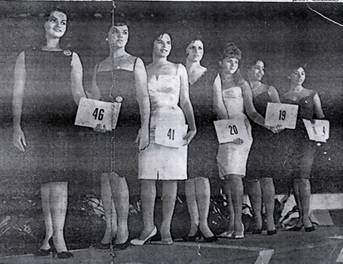
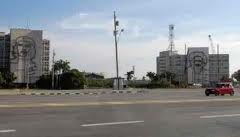
 I don’t doubt the phrase, “Hasta la victoria siempre!” — Onward to permanent victory — was written by Che, but the phrase, “Vas bien, Fidel” — You’re doing fine, Fidel — raised my doubts. For many years Fidel’s famous question — “How am I doing, Camilo?” — has been raised in tributes to the disappeared commander without anyone mentioning the response, that is now perpetuated (or better said, perpetrated) in metal in front of everyone.
I don’t doubt the phrase, “Hasta la victoria siempre!” — Onward to permanent victory — was written by Che, but the phrase, “Vas bien, Fidel” — You’re doing fine, Fidel — raised my doubts. For many years Fidel’s famous question — “How am I doing, Camilo?” — has been raised in tributes to the disappeared commander without anyone mentioning the response, that is now perpetuated (or better said, perpetrated) in metal in front of everyone. There are two laws in Cuba: the first, written in ink, the second in frustration and pain. The first, a symbolism that rests on sterile paper, in the Constitution and legal codes, which allegedly belong to all Cubans, without distinctions of any kind, and its romantic spirit, theoretically, we are all equal in powers and rights. This is the one quoted by the army of large, medium, small and tiny leaders, always in tones very momentous as the culmination of the dream of heroes. This is the one of the front page of the newspaper Granma, which extols vibrant speeches that seemed touched by hand from the dais or the bench or from the comfort of the high offices, which vows that “… Every citizen is entitled to lodge complaints and petitions to the authorities and to receive attention or relevant and timely responses appropriate under the law .”(*)
There are two laws in Cuba: the first, written in ink, the second in frustration and pain. The first, a symbolism that rests on sterile paper, in the Constitution and legal codes, which allegedly belong to all Cubans, without distinctions of any kind, and its romantic spirit, theoretically, we are all equal in powers and rights. This is the one quoted by the army of large, medium, small and tiny leaders, always in tones very momentous as the culmination of the dream of heroes. This is the one of the front page of the newspaper Granma, which extols vibrant speeches that seemed touched by hand from the dais or the bench or from the comfort of the high offices, which vows that “… Every citizen is entitled to lodge complaints and petitions to the authorities and to receive attention or relevant and timely responses appropriate under the law .”(*) Six years ago, when Fidel spoke of increasing wages, we were all very excited because after several years of scarcities and needs this would help bolster our economy in the home. Substantial increases were expected, according to job performance and level of expertise.
Six years ago, when Fidel spoke of increasing wages, we were all very excited because after several years of scarcities and needs this would help bolster our economy in the home. Substantial increases were expected, according to job performance and level of expertise.

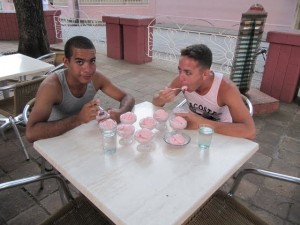 Yosuan is a sixteen year old high school student who has a special plan for his summer vacation: beach and reggae. His father is in jail. He got an eighteen-year sentence for killing cows. When his mother can afford to she gives him some hard currency, and then he can go to a high-class discotheque.
Yosuan is a sixteen year old high school student who has a special plan for his summer vacation: beach and reggae. His father is in jail. He got an eighteen-year sentence for killing cows. When his mother can afford to she gives him some hard currency, and then he can go to a high-class discotheque.